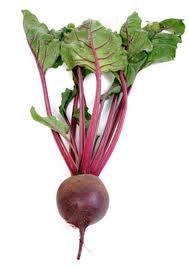 The Beet, a delicious root vegetable native to the Mediterranean, have been consumed by humans before written history began. Before the 19th century, beets were generally consumed for their medicinal qualities. However, during the dawn of French cuisine, famed chefs such as Brillat Savarin recognized the power and potency of these roots in regards to general culinary use. From these early origins, beets became a staple food in many world cultures.
The Beet, a delicious root vegetable native to the Mediterranean, have been consumed by humans before written history began. Before the 19th century, beets were generally consumed for their medicinal qualities. However, during the dawn of French cuisine, famed chefs such as Brillat Savarin recognized the power and potency of these roots in regards to general culinary use. From these early origins, beets became a staple food in many world cultures.
Botanically known as Beta vulgaris, beets are not just used in foods, but find a place in the making of dyes. While less common today, using beets to create powerful hues of red was rather common until the early 20th century. Today, beets are still used to color many foods such as candies and tomato sauce. Another common use of beets is to produce sugar. During WWII, when sugar cane was scarce, beets from the north of France were converted into sugar for use in pastries, coffee and tea. To this day, much of the sugar used in Europe is derived from sugar beets. While the most common color associated with beets is dark red, additional varieties include yellow, white and rainbow colors.
Key Nutrients
Beets are a great source of iron, calcium, vitamin A and vitamin C. They are also a great source of betanin, a compound known to inhibit cancer growth. Finally, beets are a great source of natural sugars, and are often used to make refined sugar in Europe.
Health Benefits
Beets can help to reduce cholesterol and triglycerides by increasing the amount of HDL in the blood. Studies revealed that beet are good in preventing colon cancer since they contain betacyaninis. Beets also contain Betaines, which help to stimulate the functions of liver.
Vitamin A – Vitamin A, when converted into retinaldehyde, is a vital compound for healthy eyes. Furthermore, vitamin A is believed to fight against cataracts, macular degeneration and glaucoma. Vitamin A strengthens the membranes of the human body such as mucous membranes, respiratory, urinary and intestinal tracts. It is also essential for the lymphocytes, or white blood cells, that fight infection once in the body.
Vitamin C – Regular consumption of foods rich in vitamin C helps the body develop resistance against infections and scavenges harmful, pro-inflammatory free radicals. Vitamin C also helps to prevent respiratory problems such as asthma and lung cancer. Vitamin C has been shown to lower blood pressure, and therefore lessen the probability of hypertension.
Iron –Iron, found in red blood cells, is an integral part of hemoglobin. Hemoglobin carries oxygen from the lungs to the cells. Iron is an essential component of many enzymes necessary for various chemical reactions in the body.
Calcium – Calcium is an important mineral for bone and teeth growth and maintenance. It is also an important mineral in terms of cardiovascular function.
Season
Beets reach maturity in the late summer and early autumn. Since they store so well, you can find them throughout the winter as well.
Nutrition Information
Per 1 cup (135 grams):
Calories (cKal): 58
Protein (grams): 2.19
Total Fat (grams): .23
Carbohydrates (grams): 13
Fiber (grams): 3.8
Buying and Storing
When buying beets, make sure they are not damaged or discolored. If the beets contain their upper leaves, make sure they are not damaged or discolored. Beets are known to contain a fair amount of dirt when purchased, so don’t let this discourage your desire or selection. Beets can be stored in a cool, dry room for up to one month. Before consuming, make sure to wash the beets under cold water for at least 30 seconds.
Best Way to Add to Diet
The most common way to prepare beets is to boil them in water until tender. Once cooked, peel the beets and slice to serve. Additionally, roasted beets taste fantastic. Place the beets in a baking pan along with a small amount of olive oil, sea salt and pepper. Roast the beets until a fork can be easily inserted into the flesh.
Beet Recipe
Roasted Beets with Salad Greens

 Not Sure What Healthy Foods To Eat?
Not Sure What Healthy Foods To Eat? This week we take a look at one of my favorite healthy foods...the mighty Avocado.
This week we take a look at one of my favorite healthy foods...the mighty Avocado.
No comments yet.